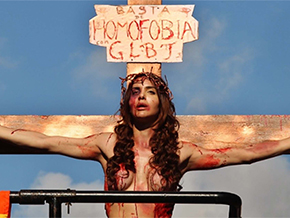Do you remember the transsexual actress and activist Viviany Beleboni?
+I was a victim of discrimination during Carnival. And now?
+I was a victim of discrimination during Carnival. And now?
Na São Paulo LGBT Pride Parade Last year, she became famous for protesting against the hate crimes that victimize our community through a reenactment of Jesus' crucifixion.
Crucified From the top of an electric trio, Viviany sent a clear message: just as we made mistakes in crucifying Jesus Christ, an innocent person, today society makes mistakes in crucifying other innocent people, in this case the LGBT community.
At the time, Viviany's courage generated explosive reactions from conservatives, with an fiery statement from Senator Magno Malta (PR-ES), who condemned the act based on religious convictions. Marked by a religious bias, her statement was followed by a series of verbal attacks and threats made by unknown people against the actress. In them, the typical haters exuded hatred, saying: “He has to be screwed [sic] in the public square!” and “Riffs, sluts, disqualified, miserable”.
And, therefore, in June last year, the actress filed a lawsuit against the senator in the São Paulo Court, in which she requested that her speech be removed from circulation for inciting aggression against her, in addition to that he be sentenced to pay with the payment of compensation for moral damages in the amount of almost R$800 thousand.
Well, the senator presented his defense and, a few weeks ago, judge Letícia Antunes Tavares, from the 14th Civil Court of the São Paulo Central Forum, denied Viviany's requests. For her, “the plaintiff [Viviany] cannot become immune to possible criticism” and, by carrying out her political act, she assumed the risk of receiving it.
Furthermore, for her, “there was no offense to the applicant’s honor”. The senator, therefore, would have limited himself to condemning the act, not the person. Any offenses and threats from haters would therefore not be his responsibility, but those of those who carried out these acts.
In other words, for the judge, Viviany took the risk of being criticized – and this was predictable considering her choice to make a religious representation. Magno Malta, on the other hand, would not have addressed the word to Viviany, but to the act itself; any aggression and threat carried out by third parties, not having been incited by him, could not be his responsibility – above all, protected by the material immunity conferred by the Constitution.
Given this brave summary, many people may wonder if the decision had a transphobic background; After all, by taking a stand in favor of such a conservative and reactionary senator as Magno Malta, the judge appears to have been insensitive to the attacks suffered by the victim.
As a lawyer and human rights activist, fortunately or unfortunately, I believe that the decision was not ill-founded, nor transphobic.
This is because, legally speaking, Magno Malta is not responsible for the acts of third parties. And insisting on the strategy of holding opinion makers legally responsible for the acts committed by their followers, as if there were a causal link between them, has not proven to be an effective strategy within the law, where individual autonomy is extremely valued. That is, where everyone is responsible for their actions.
If Magno Malta had incited his followers to harass activist Viviany, then he could have been held responsible. But that wasn't what happened. If Magno Malta had directed offenses at Viviany, then he could have been held responsible. All this, legally speaking, of course.
Politically speaking, on the other hand, we can say that Magno Malta's speech, which treats Viviany's protest as an “insult”, adds to the culture that relativizes and trivializes crimes based on sexual orientation and gender identity. Politically speaking, we can even fight for legal changes to ban intolerant speeches, even if they do not involve personal offenses, but violate the moral integrity of the LGBT community.
And why this distinction between the legal and the political? This distinction exists because what is legal is enforceable by law, including the police force if necessary. But the political is what we take to the streets as a demand. That which we still do not have guaranteed by law. Knowing this difference can help our population to know what can and cannot be demanded in the Judiciary – otherwise, our battles tend to be lost.
In the case of hate speech, legally speaking, we can demand the condemnation of individualized verbal attacks, such as insults against Viviany; We can demand the condemnation of any direct or indirect incitement to violence and discrimination, as when Silas Malafaia told the Catholic Church to “get down the bat” on the LGBT community or when a homophobic billboard was posted in Ribeirão Preto. However, we cannot legally demand that the rest of society agree with our political strategies for visibility. In these cases, the fight takes place in the field of political debate.
Finally, I do not want to discourage our community from seeking their rights, but to encourage this fight to take place in a well-informed way so that our efforts bear fruit.
* Thales Coimbra is a militant lawyer and specialist in LGBT law (OAB/SP 346.804); graduated from the Faculty of Law at USP, where, between 2009 and 2015, he founded and coordinated the Study Group on Law and Sexuality, and where he is currently studying a master's degree in the area of legal philosophy on homophobic hate speech; he also worked as a lawyer at the Arouche LGBT Citizenship Center, at São Paulo City Hall; and writes biweekly about Rights on the portals A Capa and NLucon. www.thalescoimbra.com.br



